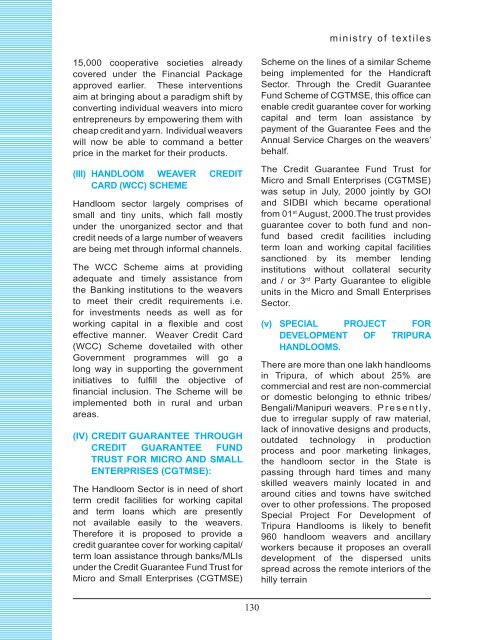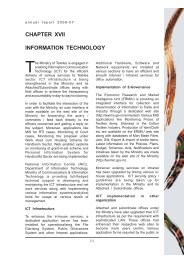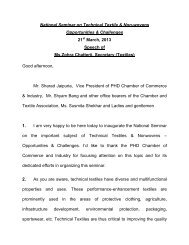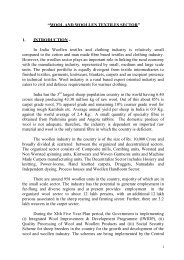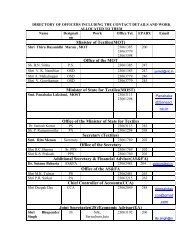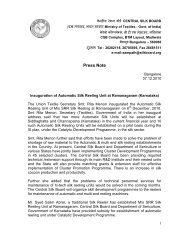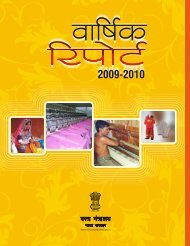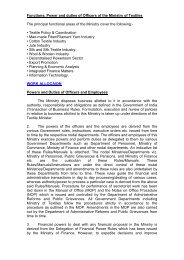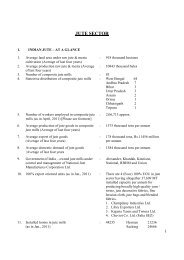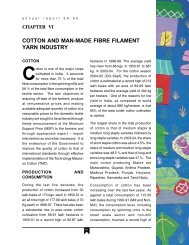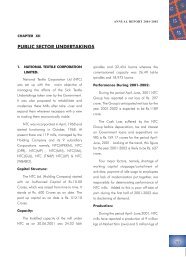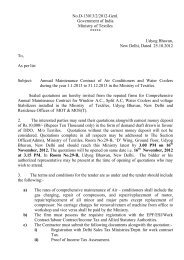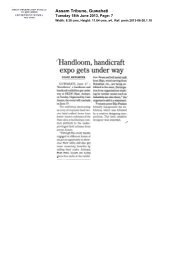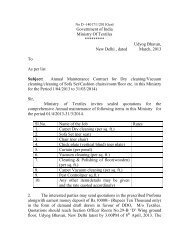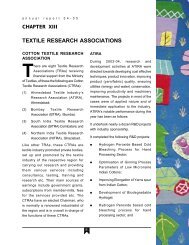chapter viii wool & wollen textiles industry - Ministry of Textiles
chapter viii wool & wollen textiles industry - Ministry of Textiles
chapter viii wool & wollen textiles industry - Ministry of Textiles
Create successful ePaper yourself
Turn your PDF publications into a flip-book with our unique Google optimized e-Paper software.
ministry <strong>of</strong> <strong>textiles</strong><br />
15,000 cooperative societies already<br />
covered under the Financial Package<br />
approved earlier. These interventions<br />
aim at bringing about a paradigm shift by<br />
converting individual weavers into micro<br />
entrepreneurs by empowering them with<br />
cheap credit and yarn. Individual weavers<br />
will now be able to command a better<br />
price in the market for their products.<br />
(iii) HANDLOOM WEAVER CREDIT<br />
CARD (WCC) SCHEME<br />
Handloom sector largely comprises <strong>of</strong><br />
small and tiny units, which fall mostly<br />
under the unorganized sector and that<br />
credit needs <strong>of</strong> a large number <strong>of</strong> weavers<br />
are being met through informal channels.<br />
The WCC Scheme aims at providing<br />
adequate and timely assistance from<br />
the Banking institutions to the weavers<br />
to meet their credit requirements i.e.<br />
for investments needs as well as for<br />
working capital in a flexible and cost<br />
effective manner. Weaver Credit Card<br />
(WCC) Scheme dovetailed with other<br />
Government programmes will go a<br />
long way in supporting the government<br />
initiatives to fulfill the objective <strong>of</strong><br />
financial inclusion. The Scheme will be<br />
implemented both in rural and urban<br />
areas.<br />
(iv) Credit Guarantee through<br />
Credit Guarantee Fund<br />
Trust for Micro and Small<br />
Enterprises (CGTMSE):<br />
The Handloom Sector is in need <strong>of</strong> short<br />
term credit facilities for working capital<br />
and term loans which are presently<br />
not available easily to the weavers.<br />
Therefore it is proposed to provide a<br />
credit guarantee cover for working capital/<br />
term loan assistance through banks/MLIs<br />
under the Credit Guarantee Fund Trust for<br />
Micro and Small Enterprises (CGTMSE)<br />
Scheme on the lines <strong>of</strong> a similar Scheme<br />
being implemented for the Handicraft<br />
Sector. Through the Credit Guarantee<br />
Fund Scheme <strong>of</strong> CGTMSE, this <strong>of</strong>fice can<br />
enable credit guarantee cover for working<br />
capital and term loan assistance by<br />
payment <strong>of</strong> the Guarantee Fees and the<br />
Annual Service Charges on the weavers’<br />
behalf.<br />
The Credit Guarantee Fund Trust for<br />
Micro and Small Enterprises (CGTMSE)<br />
was setup in July, 2000 jointly by GOI<br />
and SIDBI which became operational<br />
from 01 st August, 2000.The trust provides<br />
guarantee cover to both fund and nonfund<br />
based credit facilities including<br />
term loan and working capital facilities<br />
sanctioned by its member lending<br />
institutions without collateral security<br />
and / or 3 rd Party Guarantee to eligible<br />
units in the Micro and Small Enterprises<br />
Sector.<br />
(v) SPECIAL PROJECT FOR<br />
DEVELOPMENT OF TRIPURA<br />
HANDLOOMS.<br />
There are more than one lakh handlooms<br />
in Tripura, <strong>of</strong> which about 25% are<br />
commercial and rest are non-commercial<br />
or domestic belonging to ethnic tribes/<br />
Bengali/Manipuri weavers. P r e s e n t l y,<br />
due to irregular supply <strong>of</strong> raw material,<br />
lack <strong>of</strong> innovative designs and products,<br />
outdated technology in production<br />
process and poor marketing linkages,<br />
the handloom sector in the State is<br />
passing through hard times and many<br />
skilled weavers mainly located in and<br />
around cities and towns have switched<br />
over to other pr<strong>of</strong>essions. The proposed<br />
Special Project For Development <strong>of</strong><br />
Tripura Handlooms is likely to benefit<br />
960 handloom weavers and ancillary<br />
workers because it proposes an overall<br />
development <strong>of</strong> the dispersed units<br />
spread across the remote interiors <strong>of</strong> the<br />
hilly terrain<br />
130


